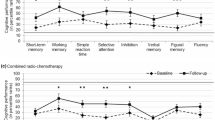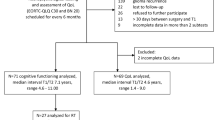Abstract
Quality of life in brain tumour patients is an emerging issue and has prompted neurosurgeons to reconsider the need for cognitive assessment in the course of treatment. In particular, to date there has been a lack of comprehensive neuropsychological assessment performed preoperatively and in the acute postoperative period. We examined 29 patients with glioma, analysing several functional domains—intelligence, executive functions, memory, language, praxis, gnosis and mood state—in order to establish the effect of tumour and surgery on cognition. At baseline, using test- and domain-based criteria, 79% and 38% of patients, respectively, were impaired, the former related to tumour factors such as oedema (P < 0.05), larger size (P < 0.05) and higher grade (P = 0.001). Verbal memory, visuospatial memory and word fluency were the most frequently affected functions, partly associated with depression. Postoperatively, again using test- and domain-based criteria, 38% and 55% of patients, respectively, were unchanged, 24% and 21% improved, and 38% and 24% worsened; 24% and 62% of patients were intact, respectively. The extent of removal did not influence the outcome. Improvement involved previously impaired functions and was correlated with high-grade tumours. Worsening regarded executive functions was related to tumour size and was partly explained by radiological findings on postoperative magnetic resonance imaging (MRI). This preliminary study, focussing on the effects of tumour and surgery, showed that tumour significantly affects cognitive functions, mainly due to the mass effect and higher grading. Surgical treatment improved the functions most frequently affected preoperatively and caused worsening of executive functions soon after operation, leaving the overall cognitive burden unchanged and capable of improvement prospectively.
Similar content being viewed by others
References
Meyers CA, Brown PD (2006) Role and relevance of neurocognitive assessment in clinical trials of patients with CNS tumors. J Clin Oncol 24(8):1305–1309
Sanai N, Mirzadeh Z, Berger MS (2008) Functional outcome after language mapping for glioma resection. New Engl J Med 358(1):18–27
Sherer M, Meyers CA, Bergloff P (1997) Efficacy of post acute brain injury rehabilitation for patients with primary malignant brain tumor. Cancer 80(2):250–257
Bosma I, Vos MJ, Heimans JJ, Taphoorn MJB, Aaronson NK, Postma TJ, van der Ploeg HM, Muller M, Vandertop WP, Slotman BJ, Klein M (2007) The course of neurocognitive functioning in high-grade glioma patients. Neuro-Oncol 9:53–62
Stummer W, Pichlmeier U, Meinel T, Wiestler OD, Zanella F, Reulen HJ, ALA-Glioma Study Group (2006) Fluorescence-guided with 5-aminovenulinic acid for resections of malignant glioma—a randomised controlled multicentre phase III trial. Lancet Oncol 7(5):392–401
Beck TA (1972) Depression causes and treatment. University of Pennsylvania Press, Philadelphia
Spielberger CD (1970) STAI state-trait anxiety inventory Forma Y. Organizzazioni Speciali, Florence
Oldfield RC (1971) The assessment and analyses of handedness: the Edinburgh inventory. Neuropsychologia 9:97–113
Caltagirone C, Perri R, Musicco M (2001) La fase preclinica della malattia di Alzheimer. Cortical Medicine, Roma
Giovagnoli AR, Del Pesce M, Mascheroni S, Simoncelli M, Laicona M, Capitani E (1996) Trail making test: normative values from 287 normal adult controls. Int J Neurol Sci 17:305–309
Spinnler H, Tognoni G (1987) Standardizzazione e taratura italiana di test neurologici. Ital J Neurol Sci 7(suppl. 8):1–120
Rey A (1983) Reattivo della figura complessa. Manuale Organizzazioni Speciali, Florence
Laiacona M, Barbarotto R, Trivelli C, Capitani E (1993) Dissociazioni semantiche intercategoriali: descrizione di una batteria standardizzata e dati normativi. Archivio di Neurologia, Psichiatria e Psicologia 54:209–248
Bisiach E, Cappa S, Vallar G (1983) Guida all’esame neuropsicologico. Raffaello Cortina, Milano
Hochberg FH, Slotnick B (1980) Neuropsychologic impairment in astrocytomas survivors. Neurology 30(2):172–177
Archibald YM, Lunn D, Ruttan LA, Macdonald DR, Del Maestro RF, Barr HWK, Pexman JHW, Fisher BJ, Gaspar LE, Cairncross JG (1994) Cognitive functioning in long term survivors of high-grade glioma. J Neurosurg 80:247–253
Mackworth N, Fobair P, Prados M (1992) Quality of life self-reports from 200 brain tumor patients: comparisons with Karnofsky performance scores. J Neuro-Oncol 14:243–253
Taphoorn MJ, Heimans JJ, Snoek FJ, Lindeboom J, Oosterink B, WOlberg JG, Karim ABM (1992) Assessment of quality of life in patients treated for low-grade glioma: a preliminary report. J Neurol Neurosur Psychiatry 55:372–376
Giovagnoli AR, Boiardi A (1994) Cognitive impairment and quality of life in long-term survivors of malignant brain tumors. Ital J Neurol Sci 15:481–488
Pålson A, Ek L, Ahlström G, Smita A (2003) Pitfalls in the assessment of disability in individual with low-grade gliomas. J Neuro-Oncol 65:149–158
Klein M, Heimans JJ, Aaronson NK, van der Ploeg HM, Grit J, Muller M, Postma TJ, Mooji JJ, Boerman RH, Beute GN, Ossenkoppele GJ, van Imhoff GF, Dekker AW, Jolles J, Slotman BJ, Struikmans H, Taphoorn MJB (2002) Effect of radiotherapy and other treatment related factors on mid-term to long-term cognitive sequelae in low-grade gliomas: a comparative study. Lancet 360(2):1361–1368
Klein M, Engelberts NHJ, van der Ploeg HM, Kasteleijn-Nolst Trenitè DGH, Aaronson NK, Taphoorn MJB, Baijen H, Vandertop WP, Muller M, Postma TJ, Heimans JJ (2003) Epilepsy in low-grade gliomas: the impact on cognitive function and quality of life. Ann Neurol 54:514–520
Correa DD, DeAngelis MM, Shi W, Thaler HT, Lin M, Abrey LE (2007) Cognitive functions in low-grade gliomas: disease and treatment effect. J Neurooncol 81(2):175–184
Starkman MN, Giordani B, Berent S, Schork A, Schteingart DE (2001) Elevated cortisol levels in Cushing’s disease are associated with cognitive decrements. Psychosom Med 63:985–993
Jagaroo V, Rogers MP, Black McLP (2000) Allocentric visuospatial processing in patients with cerebral gliomas: a neurocognitive assessment. J Neuro-Oncol 49:235–248
Hahn CA, Dunn RH, Logue PE, King JH, Edwards CL, Halperin EC (2003) Prospective study of neuropsychologic testing and quality of life assessment of adults with primary malignant brain tumors. IJRB 55(4):992–999
Budrukkar A, Jalali R, Dutta D, Sarin R, Devlekar R, Parab S, Kakde A (2008) Prospective assessment of quality of life in adult patients with primary brain tumors in routine neurooncology practice. J Neuro-Oncol 90(3):413–419
Costello A, Shallice T, Gullan R, Beaney R (2004) The early effects of radiotherapy on intellectual and cognitive functioning in patients with frontal brain tumors: the use of a new neuropsychological methodology. J Neuro-Oncol 67:351–359
Taphoorn MJB, Klein M (2004) Cognitive deficits in adult patients with brain tumors. Lancet Neurol 66(3):159–168
Yoshii Y, Tominaga D, Sugimoto K, Tsuchida Y, Hyodo A, Yonaha H, Kushi S (2008) Cognitive function of patients with brain tumor in pre- and postoperative stage. Surg Neurol 69:51–61
Tucha O, Smely C, Preier M, Lange KW (2000) Cognitive deficits before treatment among patients with brain tumors. Neurosurgery 47:324–333
Pringle A-M, Taylor R, Whittle JR (1999) Anxiety and depression in patients with an intracranial neoplasm before and after tumor surgery. Br J Neurosurg 13(1):46–51
Anderson SW, Damasio H, Tranel D (1990) Neuropsychological impairments associated with lesions caused by tumor or stroke. Arch Neurol 47:397–405
Grant R, Slattery J, Gregor A, Whittle IR (1994) Recording neurological impairment in clinical trials of glioma. J Neuro-Oncol 19:37–49
Broglio PS, Puetz TW (2008) The effect of sport concussion on neurocognitive function, self-report symptoms and postural control. Sports Med 38(1):53–67
Keith JR, Puente AE, Malcolmson KL, Tartt S, Coleman AE (2002) Assessing postoperative cognitive change after cardiopulmonary bypass surgery. Neuropsychology 16(3):411–421
Duffau H, Lopes M, Arthuis F, Bitar A, Sichez JP, Van Effenterre R, Capelle L (2005) Contribution of intraoperative electrical stimulations in surgery of low grade gliomas: a comparative study between two series without (1985–96) and (1996–2003) functional mapping in the same institution. J Neurol Neurosurg Psychiatry 76:845–851
Teixidor P, Gatignol P, Leroy M, Aumatell C, Capelle L, Duffau H (2007) Assessment of verbal working memory before and after surgery for low-grade glioma. J Neuro-Oncol 81:305–313
Kaleita TA, Wellish DK, Cloughesy TF, Ford JM, Freeman D, Belin TR, Goldman J (2004) Prediction of neurocognitive outcome in adult brain tumor patients. J Neuro-Oncol 67:245–253
Conflict of interest
The authors report no conflict of interest concerning the materials or methods used in this study or the findings specified in this paper.
Author information
Authors and Affiliations
Corresponding author
Rights and permissions
About this article
Cite this article
Talacchi, A., Santini, B., Savazzi, S. et al. Cognitive effects of tumour and surgical treatment in glioma patients. J Neurooncol 103, 541–549 (2011). https://doi.org/10.1007/s11060-010-0417-0
Received:
Accepted:
Published:
Issue Date:
DOI: https://doi.org/10.1007/s11060-010-0417-0




